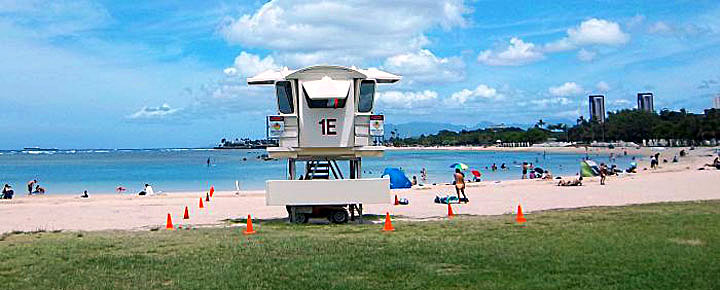Picture this: you’re ready for a relaxing day at the beach, sunblock applied and book in hand. But instead of unwinding, you find yourself anxiously clutching a waterproof bag with your phone, keys, and wallet bobbing in the ocean beside you. According to the Honolulu Police Department, this is the new norm for safeguarding your valuables. While the intention behind the advice might be sound, it poses practical questions about usability and even risks to personal electronics.
Bridging the safety perception gap.
In a place celebrated for its laid-back vibes and stunning landscapes, the contrast between the promoted safety and actual experiences can be stark. Reports and statistics paint a picture of declining crime rates, yet the police department’s advisory to hold onto your valuables while swimming seems to undermine these claims. If Hawaii is as safe as advertised, why do such drastic measures feel necessary?
The local’s take: is this advice practical or preposterous?
As someone who has spent countless days enjoying Hawaii’s beaches without incident over decades, the recommendation to swim with my valuables feels more comical than practical. It suggests a lack of effective, on-the-ground strategies to deal with theft and other safety issues proactively. Moreover, the advice might even lead to new problems, like damaged electronics or distracted swimmers.
When we travel to another island, we usually wrap the rental car key in a towel and place it near the lifeguard station with our other belongings. Our cell phone and wallet (with limited cash and a credit card) are left hidden under the car seat and out of view before leaving. In all the years we have lived on Kauai and traveled to other islands, we have thankfully never had an issue.
Salt water and cell phones don’t mix.
When cell phones get wet with salt water, like from the ocean in Hawaii, bad things can occur. Salt water is particularly harmful because it is highly conductive and corrosive. In contact with the metal components inside a cell phone, it can cause oxidation and corrosion leading to permanent damage. When the salt water dries, it leaves behind minerals that can form causing further damage.
Some say that if your phone gets wet in salt water, keep it turned off then immediately dry it then place in a bag with a desiccant or dry rice. This may help absorb moisture, but it has not worked for us!
Conclusion: a call for realistic and practical safety strategies.
Hawaii’s reputation as a safe tourist haven is valuable, and maintaining it requires more than just reactive measures. It’s time for local authorities to rethink how they address safety concerns, ensuring that their advice doesn’t just shift the burden to tourists but genuinely enhances their security. Let’s hope for a strategy that supports uninterrupted enjoyment of Hawaii’s beautiful shores rather than turning beachgoers into anxious guardians of their gear.
What’s your take on the Honolulu Police Department’s advice? Have you ever taken your valuables into the ocean? Share your experiences and thoughts below.
Get Breaking Hawaii Travel News







Not much of a beach person anymore, I like walking and hiking for recreation now. I always carry just the absolute basics to minimize any losses if I’m walking through Waikiki or up on the ridges – small amount of cash (less than $20), special locked debit card that I keep only a couple hundred dollars or so in, ID, phone if hiking, if I’m walking in the city I don’t bother carrying one. I never leave anything in the vehicle and I don’t tempt fate by insisting on finding that “perfect extremely remote location” so many people try to find nowadays. Back when I was a kid you didn’t go there Because of the remoteness and the people who tend to hang out in such places…
Best Regards
I was taking a video of the calm ocean when an unexpected big wave took over the beach and my Cell phone …I was able to rescue it, but I can no longer send or receive messages or phone calls. I could also not open my car & another EV driver was kind enough to drive me home to get the “valet card”. I tried to dry it and Spectrum tried it with a new simcard, but it’s not working, so I can confirm that salt water and cell phones don’t mix & that my phone is permanently damaged! Regarding crime, I iive in Maui and never had anything stolen!
While taking your valuables into the ocean with you seems odd (actually almost a parody), the basic idea is good, whichever is to not leave valuables unattended.
We have been to Hawaii (Oahu) twice. Going to Waikiki phones, wallets, purses, etc were secured in the hotel room. At other beaches around the island they were locked in the car trunk, with the car key either in my beach bag or his cinch-sack. We brought beverages in a small cooler bag so we didn’t need a lot of cash at hand. That worked very well for us.